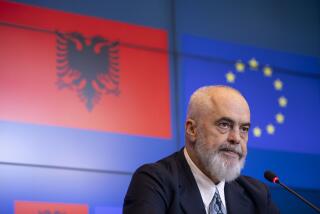A Marshall Plan for Albania
- Share via
TIRANA, Albania — Since the beginning of Operation Allied Force, the focus has concentrated on two unfolding dramas: The progress of the air campaign against Yugoslavia and the plight of hundreds of thousands of Kosovo Albanian refugees who are the victims of Slobodan Milosevic’s campaign of murder and mass deportation.
This focus is understandable. But lost in the debates over bombing and how to best manage a refugee crisis of biblical proportions is the devastating effect the disaster has had on Kosovo’s neighbors--above all, on Albania, which, with what under the circumstances is an amazing degree of fortitude and resolve, has borne the brunt of the refugee exodus.
Every refugee emergency strains the material, moral and political fabric of the host societies. Such unanticipated demands on resources, from budgets and social service infrastructures to roads, water supplies, housing and sanitation, are only part of the difficulty. Both the practical capacities and the emotional and political readiness of people to help the refugees over a protracted period--help that often involves people who have very little in looking after other people who need everything and may stay on indefinitely--are always sorely tested.
Such challenges are difficult enough for a rich society, as any American who experienced the arrival of the Cubans in South Florida in the Mariel boatlift of 1980 or of hundreds of thousands of Central Americans in Southern California in the mid-1980s can attest. The dangers they pose to poor societies are exponentially more daunting.
And Albania, by a wide margin, is the poorest country in Europe; historically, Kosovo itself has been far more prosperous. So in effect, the Kosovo refugees need help from people they tend to view as their destitute, backward cousins.
Having suffered for half a century under a communist regime that inflicted as much economic destruction as it did savage political repression on its citizens, Albania barely had emerged in the early 1990s before it was devastated once again by a nationwide fraud scheme that deprived many of their life savings. Then it was plunged into civil war. Politically divided, socially dislocated and in economic free fall, Albania is now in absolutely no position to see to the needs of a refugee population that may soon total half a million (or more) without massive international assistance.
The crisis is dire. But it also provides a unique opportunity for the U.S. and its NATO partners to put Albania firmly on the road to recovery. The Albanian government recognizes this, which--along with the more obvious motivation of solidarity with what ordinary Albanians frequently and without affectation call their Kosovo “brothers and sisters”--is why it has insisted that the refugees remain, rather than being moved on to resettlement in other countries.
Still, the strains on Albania’s infrastructure and political stability have become so severe that this policy may rapidly become unsustainable. As John Fawcett, the head of the International Rescue Committee’s Albanian operations has put it, “It’s a stellar performance at all levels of the government. They have no experience of refugees, but they are using all the resources they have.”
Fawcett’s teams are struggling to rehabilitate housing for refugees and improve sanitation and health services in areas that were not well-served to begin with. The teams are supporting local health authorities with equipment and expertise in areas where the population has increased by 30% and sometimes 50%. But Fawcett warns that the West’s commitment must be long term and systematic and take into account the needs of ordinary Albanians as well as Kosovo Albanian refugees.
Even were the Kosovo Albanians to return home in the foreseeable future--and without NATO ground action, few aid officials hold out much hope of that--an immense amount of work will have to be done in Albania proper at the same time war-ravaged Kosovo’s needs are being addressed.
Such aid cannot, despite what some U.S. government officials appear to believe, be limited to aiding a few narrowly-defined beneficiary groups within Albanian society that the current crisis has placed at particular risk. The agenda, if Albania is to survive, must be far bolder and more far-reaching.
In the Kosovo crisis, as in other recent humanitarian emergencies, the old modalities no longer suffice. The humanitarian and the political (and, in Kosovo, military action as well) can no longer be separated easily. A stable, peaceful Kosovo can obviously never come into being so long as a single Serb soldier, policeman or paramilitary remains in the province.
But there also will never be stability there if Albania is allowed to remain an economic basket case. That is why the Marshall Plan for the region that the Albanian government has called for, and that aid workers on the ground believe is indispensable, must become as much a cornerstone of Western policy as the military effort to undo the ethnic cleansing of Kosovo.
More to Read
Sign up for Essential California
The most important California stories and recommendations in your inbox every morning.
You may occasionally receive promotional content from the Los Angeles Times.













